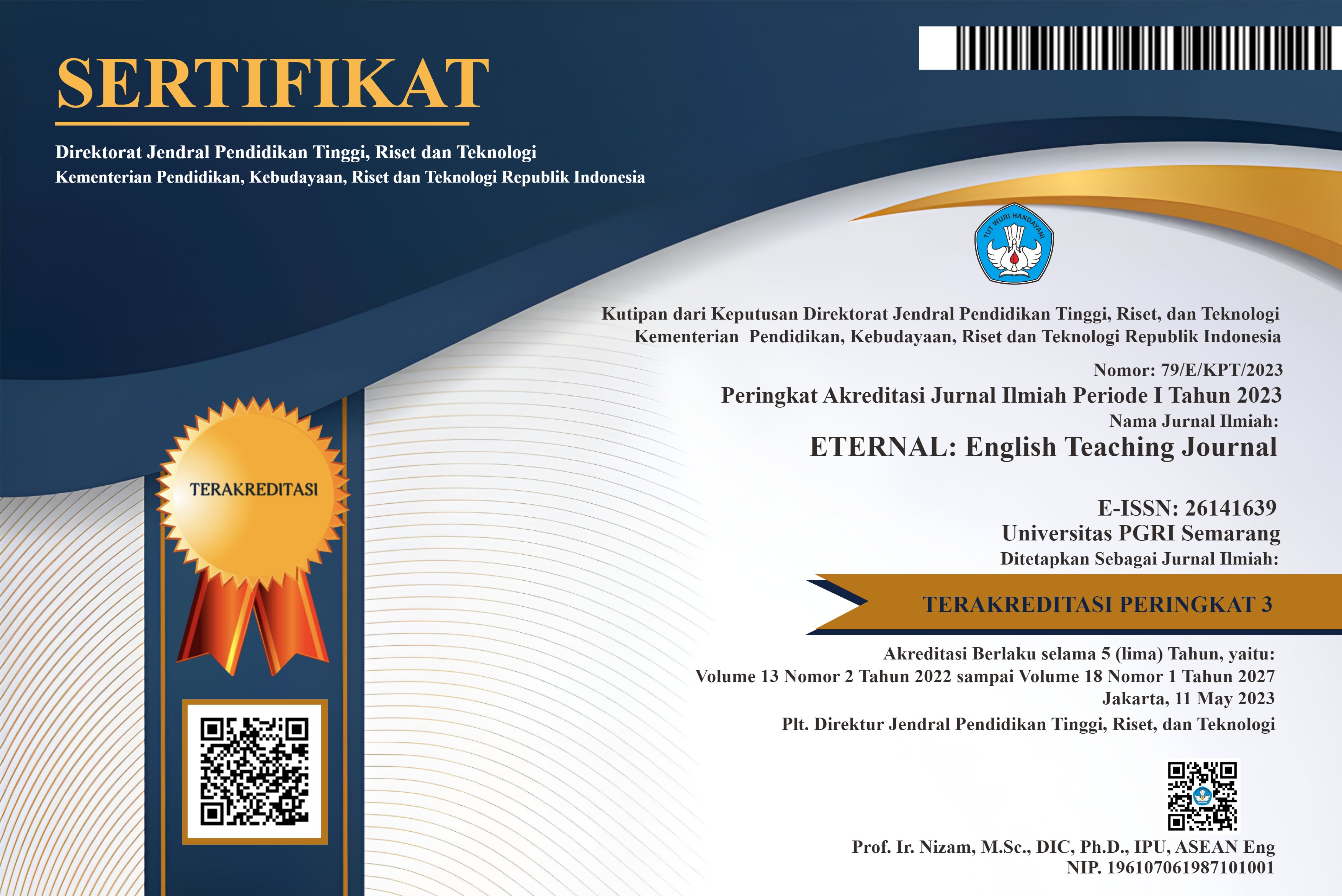Implementation of the STAD Cooperative Learning Model to Improve Indonesian Language Learning Outcomes in Elementary School
DOI:
https://doi.org/10.26877/eternal.v16i1.1113Keywords:
STAD Cooperative Learning, Language Learning, Classroom Action ResearchAbstract
Indonesian language learning at the elementary school level faces challenges in engaging students and improving learning outcomes. This study aims to enhance Indonesian language learning outcomes in fourth-grade students at SD Lafau Fadorozai through the implementation of the STAD (Student Teams-Achievement Divisions) cooperative learning model. The study adopts a Classroom Action Research (CAR) design involving a single class as the research subject. Data were collected through observations, learning outcome tests, and questionnaires on student response. The implementation of the STAD cooperative learning model was conducted two cycles, focusing on Indonesian language learning. The research results indicate a significant improvement in students' learning outcomes with average score after the application of the STAD model, as evidenced by an increase in The average post-test score (Mean = X) was significantly higher than the average pre-test score (Mean = Y), with a significant difference (p < 0.05) on learning outcome tests and positive student responses toward cooperative learning. The pre-test score was 63.47 and the post-test 66.53 the increase was 4.82%. These findings suggest that the STAD cooperative learning model is an effective strategy for improving Indonesian language learning outcomes at the elementary school level. This study underscores the importance of cooperative learning models in enhancing the quality of Indonesian language education at the elementary school level.
References
Academia, Concortia. 2021. “School Environment, Cooperative Learning, and English Language Deep Learning Strategy among Chinese College Students.” International Journal of Research Studies in Language Learning 10(2). doi: https://doi.org/10.5861/ijrsll.2021:contentReference[oaicite:2]{index=2}.
Chim, Hastings. 2015. “Literature Review of the Cooperative Learning Strategy – Student Team Achievement Division (STAD).” International Journal of Education 7(1):29. doi: 10.5296/ije.v7i1.6629.
Firdaus, Firdaus. 2017. “Penerapan Model Pembelajaran Cooperative Learning Tipe Stad Untuk Meningkatkan Kemampuan Membaca Pemahaman Bahasa Inggris.” Jurnal Penelitian Pendidikan UPI 17(1):20–27.
Güven, M., & Duman, B. 2007. “The Effect of Cooperative Learning Method on the Academic Achievement of Students in Teaching English as a Foreign Language.".” Journal of Language and Linguistic Studies 3(2):191–203.
Haryanto. 2021. Pedoman Praktis Implementasi Model Pembelajaran Kooperatif Tipe STAD. Yogjakarta: Penerbit buku Yogyakarta.
Huda, Miftahul. 2011. Cooperative Learning: Metode, Teknik, Struktur, Dan Model Penerapan. Yogjakarta: Pustaka pelajar.
Ishtiaq, M. I., Ali, Z., & Salem, M. S. 2017. “An Experimental Study of the Effect of STAD on Vocabulary Learning.” Arab World English Journal.
Izzaty, Rika eka. 2013. Perkembangan Peserta Didik. Yogjakarta: UNY Press.
Kemmis, S., & Wilkinson, M. 2018. Participatory Action Research and Educational Practice. In D. Scott & M. Usher (Eds.), Understanding Educational Research. Routledge.
Kilic, D. 2008. “‘The Effect of the STAD Method on the Academic Achievement of Primary School Students.’” Eurasian Journal of Educational Research 8(31):59–74.
Lie, Anita. 2003. Cooperative Learning (Mempraktikkan Cooperative Learning Di Ruang-Ruang Kelas). Jakarta: Grasindo.
Maelasari, E., and Wahyudin. 2017. “Effects of Cooperative Learning STAD on Mathematical Communication Ability of Elementary School Student.” Journal of Physics: Conference Series 895(1). doi: 10.1088/1742-6596/895/1/012090.
Munawar, Muhammad. 2019. “The Application of STAD-Cooperative Learning Model: Efforts to Increase Motivation and Learning Outcomes of Students in Class 5 SD N 07 Ledok Salatiga in Mathematics Subjecth in Folding Symmetry and Rotating Symmetry Topics.” MUDARRISA: Jurnal Kajian Pendidikan Islam 11(2):114–35. doi: 10.18326/mdr.v11i2.114-135.
Novita, R., & Sukenti, D. 2023. “The Effect of the Student Teams Achievement Division (STAD) Learning Method on Student Learning Outcomes in Indonesian Language Lessons at School.” Jurnal Manajemen Pendidikan Islam 4(2):473–81. doi: https://doi.org/10.31538/munaddhomah.v4i2.507.
Setiaji, Nazario Daffa. 2023. “Visual Representation in Reading Text for Fourth Graders of Students Elementary School.” Eternal Journal 14(2):157–63.
Slavin, R. .. 1995. Cooperative Learning: Theory, Research, and Practice. Boston: Allyn & Bacon.
Sumanti, S. 2023. “Penerapan Model STAD (Student Team, Achcievement Division) Untuk Peningkatan Aktivitas Dan Hasil Belajar Bahasa Indonesia Materi Menganalisis Struktur Dan Kebahasaan Teks Editorial.” Jurnal Pendidikan 32(1):83–94. doi: https://doi.org/10.32585/jp.v32i1.3462.
Wahyuni, Putri. 2019. “The Effect of Cooperative Learning Type Student Teams Achievement Division (STAD) on Understanding Mathematical Concepts in Class VIII Students of MTs N Pekanbaru.” International Journal of Trends in Mathematics Education Research 2(4):168–72. doi: 10.33122/ijtmer.v2i4.72.
Yudhanta, Vinsensius Willy, Maria Melani, Ika Susanti, Maria Indarti Rustamti, and D. A. N. Kolaborasi Siswa. 2021. “Jurnal PAJAR ( Pendidikan Dan Pengajaran ) Volume 5 Nomor 4 Juli 2021 | ISSN Cetak : 2580 - 8435 | ISSN Online : 2614 - 1337 DOI : Http://Dx.Doi.Org/10.33578/Pjr.V5i4.8441 THE IMPLEMENTATION OF STAD – TYPE COPERATIVE LEARNING MODEL TO IMPROVE STUDENTS ’ C.” 5:1019–27.
Zheng, S., & Zhou, X. 2022. “Positive Influence of Cooperative Learning and Emotion Regulation on EFL Learners’ Foreign Language Enjoyment.” International Journal of Environmental Research and Public Health, 19(19). doi: https://doi.org/10.3390/ijerph191912604:contentReference[oaicite:0]{index=0}.







